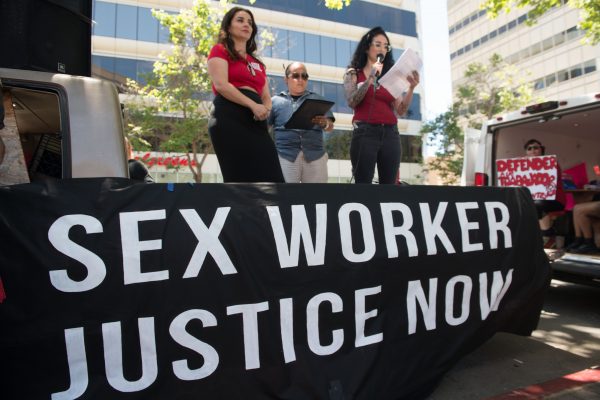How To Start A Post-SESTA Emergency Organizing Group

This post was jointly written by Maxine Holloway and Arabelle Raphael, co-founders of BAPS.
On the morning after the Senate passed FOSTA we texted each other about whether we should remove our ads from our social media accounts. We weren’t exactly sure what to do and knew that many other people were in the same situation. FOSTA had not yet been signed into law, and sex workers all over the country already had difficult decisions about our livelihoods and safety to make. Mercurial legal and cyber information and advice were flying around Twitter, online forums, text threads, and worker Facebook groups like wildfire.
We decided to host an emergency meeting for Bay Area sex workers that very weekend. We hoped we would gather a few people in Maxine’s small Oakland living room to share information, and figure out the best ways to move forward. Our small meeting quickly turned into 60-plus concerned workers RSVPing for the gathering. Because of the gravity of this situation the event promptly developed into a comprehensive cybersecurity and risk analysis training; an overview of current advertising platform options; and strategic action planning around local sex worker safety, media advocacy, and policy work.
But the most crucial thing that came from our meeting that we were able to come together to support each other. We didn’t all know each other, but so many of us were able to share and somewhat sooth the fear, sadness, and anxiety that FOSTA created. This worker-to-worker support and solidarity didn’t leave a dry eye in the house.
After our first meeting, we knew we realized how much work there was to be done to keep our communities safer, connected, informed, and empowered. We decided to create an organization to centralize the work needed to advocate for the health, safety & livelihoods of sex workers post-FOSTA/SESTA legislation: Bay Area Pros Support (BAPS).
An integral part of BAPS is to recognize the diverse and intersecting identities that make up our larger sex worker communities and to center the needs of sex workers who have been hit the hardest by FOSTA and experience the most criminalization. It is important to our organization leverage the power and privilege in our communities to create support for workers with fewer resources. One of the most critical subcommittees we have is our Outreach Committee, created to reach workers that are not online, and work with them to connect them with support.
The purpose of this article is to share the information and resources that BAPS has gathered thus far—on cybersecurity, general FOSTA/SESTA information, and post-FOSTA-SESTA organizing. Below are detailed notes and action plans for our meetings. One of the biggest lessons we have learned is that having community support through this process has been crucial. We hope that the creation of BAPS will encourage other sex workers who wish to organize in their communities as well.
When reading this guide, please keep in mind that everyone is making decisions that are incredibly hard, and only you can know what’s right for you. We tried to gather as much information to share as possible to empower people to make the best decisions for themselves. There is no one or “right” way to navigate this complicated situation.
 He was the perfect client. Well dressed and freshly showered, he brought me a small gift in which my precious dollar bills were discreetly enclosed, and our session finished before I was even fully undressed.
He was the perfect client. Well dressed and freshly showered, he brought me a small gift in which my precious dollar bills were discreetly enclosed, and our session finished before I was even fully undressed.